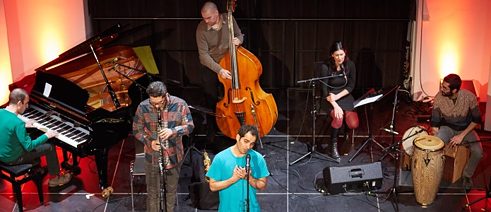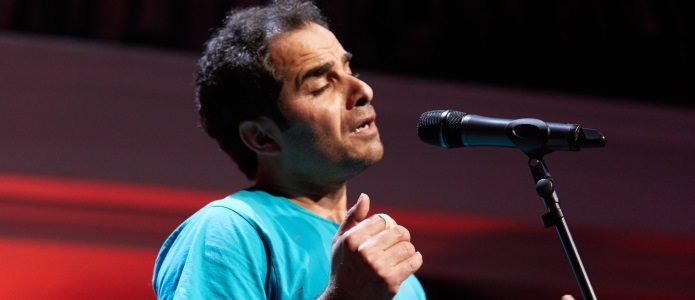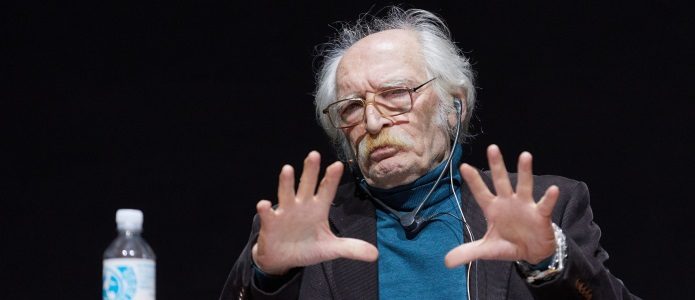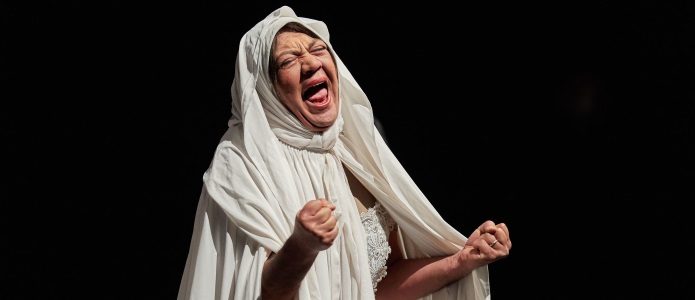Insights into the Iranian Art, Music and Literary Scenes
More modern than many think

Within a period of less than four months, more than thirty Iranian and exiled Iranian artists, cultural professionals and many visitors gathered in Berlin to demonstrate the vibrancy of the Iranian arts scene. Iranian Modernity, the Goethe-Institut’s cultural programme, produced encounters, inspired people to think and enhanced our image of what modernity means in Iran and for Iranian cultural professionals.
Modernity should not be understood as a condition, but as a continuous process, emphasized Tehran-based philosopher Hossein Mesbahian at the start of the Iranian Modernity programme. The notion that modernity is complete is misleading for Iran. More than in the west, the question is debated in Iran of what modernity is and how it can be shaped. However, the Iranian Modernity programme focused less on theories; the search for a distinct, Iranian modernity was made visible, audible and palpable in art, music and literature.
Versatility of the Iranian arts scene
Gallery-owner Anahita Ghabaian and curator Rose Issa offered insights into the arts scene in Tehran with its many hundreds of art galleries. In a country in which the scope for culture has to be constantly renegotiated, galleries are free spaces for visual art, for concerts, readings and performances that cannot easily find their place elsewhere. The fact that art is an important form of expression for the young generation in Iran was reflected in the different exhibitions, films and concerts that were brought to Berlin for Iranian Modernity. Kamakan sings in Berlin
| Photo: Bernhard Ludewig
Kamakan, a band from the Arabic-speaking part of Iran, and the German-Iranian Cymin Samawatie met only two hours before their concert. They then played together in a former crematorium in Wedding. At the CTM festival, an Iranian electronic duo, an ambient musician and the musician Ata Ebtekar performed with two classical Persian instrumentalists at Theater Hebbel am Ufer. Ata Ebtekar, who was born in Hamburg and lived on the US west coast for many years, decided to move to Tehran together with his family a couple of years ago to work there as a musician. Today, he is one of the central figures of the Tehran electronics scene, playing in galleries and at local festivals, and, looking back, describes his decision as the right step. In Berlin, the musicians broke with expectations of Iranian music and underlined the global network of the electronic avant-garde.
Kamakan sings in Berlin
| Photo: Bernhard Ludewig
Kamakan, a band from the Arabic-speaking part of Iran, and the German-Iranian Cymin Samawatie met only two hours before their concert. They then played together in a former crematorium in Wedding. At the CTM festival, an Iranian electronic duo, an ambient musician and the musician Ata Ebtekar performed with two classical Persian instrumentalists at Theater Hebbel am Ufer. Ata Ebtekar, who was born in Hamburg and lived on the US west coast for many years, decided to move to Tehran together with his family a couple of years ago to work there as a musician. Today, he is one of the central figures of the Tehran electronics scene, playing in galleries and at local festivals, and, looking back, describes his decision as the right step. In Berlin, the musicians broke with expectations of Iranian music and underlined the global network of the electronic avant-garde. Mahmud Doulatabdi at his reading in Berlin
| Photo: Bernhard Ludewig
Renowned writers such as Mahmud Doulatabadi and Nahid Tabatabai were invited to hold readings and talks, as were the young Afghan poets of The Poetry Project Berlin, who grew up in Iran and now live in Germany. The readings took place not just in public venues, but also in private homes. The author Shida Bazyar read from her novel At Night All Is Quiet in Tehran in the living room of an Iranian-German family and Belgheis Soleymani and Nasim Marashi of Iran read from their exclusively translated works at Dekhoda, the German-Iranian cultural association.
Mahmud Doulatabdi at his reading in Berlin
| Photo: Bernhard Ludewig
Renowned writers such as Mahmud Doulatabadi and Nahid Tabatabai were invited to hold readings and talks, as were the young Afghan poets of The Poetry Project Berlin, who grew up in Iran and now live in Germany. The readings took place not just in public venues, but also in private homes. The author Shida Bazyar read from her novel At Night All Is Quiet in Tehran in the living room of an Iranian-German family and Belgheis Soleymani and Nasim Marashi of Iran read from their exclusively translated works at Dekhoda, the German-Iranian cultural association.
Between music, art and literature
One of the highlights of the programme, the Iran and Modern Art conference, took place in mid-March at the Berlin Gemäldegalerie. The Goethe-Institut and Neue Nationalgalerie invited experts to re-illuminate the development of modern Iranian art. Contemporary witnesses such as Kamran Diba reported on the establishment of the Iranian and Western collection at the Tehran Museum of Contemporary Art (TMoCA), its exhibition concepts, its self-image and its mission as the leading institution for modern art. The relationship between Islamic and modern art and the Shiraz Persepolis Festival were the subjects of lectures by Susan Babaie, Fereshteh Daftari and Vali Mahlouji. Performance “Sei, wer Du nicht bist” (Be Who You Are Not), Schaubühne Berlin, 8 April 2017
| Photo: Bernhard Ludewig
The Iranian Modernity cultural programme came to an end on 8 and 9 April with the guest theatrical performance Sei, wer Du nicht bist (Be Who You Are Not) at the Schaubühne. In the performance, the Iranian director deals with transsexuality.
Performance “Sei, wer Du nicht bist” (Be Who You Are Not), Schaubühne Berlin, 8 April 2017
| Photo: Bernhard Ludewig
The Iranian Modernity cultural programme came to an end on 8 and 9 April with the guest theatrical performance Sei, wer Du nicht bist (Be Who You Are Not) at the Schaubühne. In the performance, the Iranian director deals with transsexuality.Hence, the cultural programme not only revealed artistic positions, it also produced encounters, inspired people to think and enhanced our image of what modernity means in Iran and for Iranian cultural professionals.